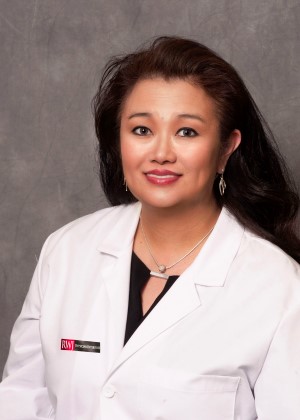"Having been a nurse at RWJUH Somerset for 18 years, I was confident in the care I was receiving."

Genetic testing changed one cancer patient's treatment plan and gave her peace of mind.
When Lorelie Estrellas, 63, was diagnosed with an early breast cancer in July 2019 after a routine mammogram and biopsy, she was distraught but not surprised.
“I have a strong family history of the disease—four first cousins and an aunt had breast cancer,” says the retired nurse, who lives in Piscataway. There were other unsettling cancers in her family tree: Two of her first cousins were diagnosed with ovarian cancer, and another had uterine cancer.
Patient navigator Kim Cromwell-Piniella, RN, referred Lorelie for genetic counseling at the Hereditary Oncology Prevention and Education (HOPE) Program, which is offered at the Steeplechase Cancer Center at Robert Wood Johnson University Hospital (RWJUH) Somerset in partnership with Rutgers Cancer Institute of New Jersey.
“When a patient has a personal and/or family history of breast and ovarian cancers, genetic testing may be recommended to see if she’s a carrier of a hereditary cancer gene mutation,” says Sarah Nashed, MS, LGC, a genetic counselor in the HOPE Program.
The most common cause of hereditary breast and ovarian cancer is due to the BRCA1 and BRCA2 genes. BRCA stands for “BReast CAncer” gene. All people carry both BRCA1 and BRCA2 genes; their role is to help prevent breast cancer. When either gene is mutated, however, it doesn’t function properly and increases the risk of developing breast and other cancers.
Testing revealed that Lorelie was a carrier of the BRCA2 mutation. Nearly 70 percent of women with this mutation will develop breast cancer by age 80, according to the National Cancer Institute (NCI). Those who are diagnosed with cancer and are successfully treated have a greater chance of developing a second cancer.
With these statistics in mind, Lorelie, who had the earliest form of breast cancer (ductal carcinoma in situ, or cancer that’s confined to the milk ducts), chose to pursue aggressive treatment.
Standard treatment involves removing the cancerous tissue (a lumpectomy) and radiation. But her breast surgeon, Deborah Lue, MD, Medical Director of Breast Cancer Services, recommended a double mastectomy. Lorelie agreed and had the surgery on August 13, 2019.

“My husband and three children told me to get a second opinion, but having been a nurse at RWJUH Somerset for 18 years, I was confident in the care I was receiving,” says Lorelie.
A Second Surgery
After the double mastectomy, Lorelie had to make another decision.
As a carrier of the BRCA2 mutation, she had an increased risk of developing ovarian cancer. (About 17 percent of women with the BRCA2 mutation develop ovarian cancer by age 80, according to the NCI.)
After a quick trip to Europe in December with her children, she had a salpingo-oophorectomy, in which her ovaries and fallopian tubes were removed. Her surgeon was Mihae Song, MD, a gynecologic oncologist at RWJUH Somerset and Rutgers Cancer Institute.
Lorelie insisted that her three sisters and 26-year-old daughter be tested for the BRCA2 mutation that she carries. While her daughter was thankfully negative, two of her sisters tested positive. One had a salpingo-oophorectomy and at press time the other planned to have surgery in 2021.
Coping with Stress
Lorelie credits yoga classes at the Steeplechase Cancer Center with helping her to cope with the cancer diagnosis and surgeries.
“They helped to reduce my fatigue and stress during that time, and helped me sleep,” recalls Lorelie, who attended a yoga class at the Steeplechase Cancer Center twice a week until the COVID-19 pandemic. She also says she benefited from the wellness boutique.
“It was a Godsend,” she says. “The staff spent hours helping me pick the right prosthetic bra.” (Lorelie decided not to undergo reconstructive surgery.)
Now that she’s cancer-free, Lorelie has made it her mission to advocate for the importance of regular mammograms and, if necessary, genetic testing.
“While about one in 400 individuals carries a BRCA1 or BRCA2 mutation, it’s important to know if you do,” says Nashed. “Not only are they linked to an increased risk of breast and ovarian cancers, but they are also linked to an increased risk of prostate cancer in men and pancreatic cancer and melanoma in both men and women. If you have any concerns, it’s important to make an appointment with a genetic counselor. It could save your life.”
For more information about the HOPE Program, call 908-243-8692.